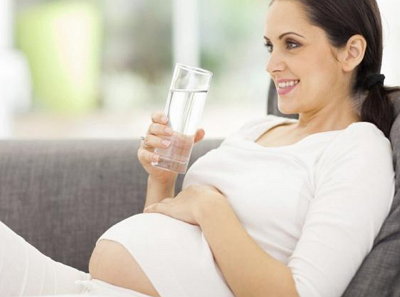Dehydration In Pregnancy

Contents:
- What Can Cause Dehydration During Pregnancy?
- What Signs and Symptoms of Dehydration During Pregnancy?
- When it is Necessary to Ask For Medical Care to Help You Cope With Dehydration?
- What The Short-Term and Long-term Effects of Dehydration May Be During Pregnancy?
Dehydration During Pregnancy
When we eat, and especially when we drink, we supply our bodies with liquid which we lose then excreted with urine, sweat, excrements and by breathing in a natural way. The body needs a certain amount of liquid to function normally, so hydration is important for health of mother and her developing child.
Liquid substances, especially water, play an important role in transportation and absorption of nutrients, as well in drainage of decay products from a body. They also make a basis of blood, digestive juice and other liquids in organism.
Dehydration occurs when we consume liquids less, than we make it. When a body is dehydrated, it can't normally carry out the main vital functions. There are less necessary electrolytic minerals in organism, such as sodium, potassium and calcium which support balance of liquid. We usually fill up liquid and electrolytes through food and drink, but during voluminous dehydration there may be some medical care required for ensuring the safety of the pregnant woman’s and her child’s health.
What can Cause Dehydration During Pregnancy?
Dehydration could easily occur when you are too busy or when you suffer abnormal indisposition and weakness that does not allow you to drink enough liquid. You can forget to take with you a bottle of water or to drink something in time when you thirst.
There are also other reasons, which may include:
- Exercises. Doing it with great intensity without sparing himself, you can put yourself into such a condition that you may develop dehydration if you don't resupply your organism by liquid.
- Diarrhea and/or vomiting. If you feel a morning indisposition which may be caused by rotavirus, you can lose a lot of liquid during this sickness. Really, dehydration is one of the most widespread complications for pregnant women with gastroenteritis (diarrhea).
- Travel. When you are on the road or in flight, you don't want to drink much to avoid visit to inconvenient public toilets. Besides, low humidity of air which has always existed inside the plane, can be harmful to you and lead your organism to dehydration.
- Sunshine and the heat. When you swear a lot, you lose a lot of liquid, accordingly. If you are on an outdoor open ground, or inside a very warm room, you may lose more liquid, than you can even assume. The higher the temperature, the more liquid you lose.
- Attempt to limit a frequency of urination. Frequent urination and needing to discharge water more often is a part of all pregnancy problems for many women. It is important that you consume enough liquid even if you have limited opportunities for toilet breaks.
What Signs and Symptoms of Dehydration During Pregnancy?

The general symptoms of dehydration include:
- excessive thirst;
- dry mouth (and sometimes dry eyes);
- the urine colour is abnormally dark yellow;
- decreasing frequency of urination;
- strong weakness;
- dizziness or vertigo.
Some women can also feel sick or a little bit drowsy when their bodies are dehydrated. Such state may also be associated with increased irritability.
Other symptoms can include:
- hypotension;
- such cardiovascular effects as tachycardia or feverish state.
How it is Possible to Prevent Dehydration?
Even if you don't thirst or you don't like taste of drinking water, you have to drink from eight to twelve glasses of water a day during pregnancy period. Drink more when the weather is warm, or when you do some sports exercises. As soon as you begin to feel thirst, your organism, perhaps, is possibly already dehydrated.
Here some more advice which will help you to avoid dehydration:
- You must drink some liquid during and after training even if you are not thirsty. Try to do sports exercises when the weather is warm, early in the morning or late at night. Or you should use for these purposes a covered, well ventilated exercise room. It may be equipped with the fan (to prevent you from overheating).
- When you are in the plane, drink a lot of liquid during flight and before landing.
- If you have a vomiting or diarrhea, it is very important that you filled up liquid loss. Get a drink of a little water more often. You may drink any other transparent liquids, such as broth, weak tea without caffeine, fruit juice (diluted with water would be better). It will help you to easy fill up necessary amount of liquid, so necessary to you and your baby.
- Avoid some milk and spicy foods if you have just gone through a diarrhea. Milk and hot spices can cause diarrhea again if you have not recovered completely yet.
- Fill a jug with water, and drink out of it every day. Try to finish a jug by the evening.
When it is Necessary to Ask For Medical Care to Help You Cope With Dehydration?
If you think that you have dehydration when you don't go to the toilet for urination during the day, and if you also have a vomiting within more than two days, urgently see a doctor! He will be able to help you to provide necessary normal amount of liquid for your organism by means of oral rehydration.
If you are much thirsty and you didn't urinate within eight hours, if, among these things, parts of your skin become wrinkled and you have dizziness, then, perhaps, your organism has been strongly dehydrated. If that is true, your doctor will perform your blood test to be convinced that you and your baby feel well, and, if necessary, will introduce necessary volume of liquid intravenously to reverse its losses in organism.
What the Short-Term And Long-Term Effects of Dehydration May Be During Pregnancy?

Intake of enough fluid is often difficult for some pregnant women, but it is very important to support the necessary level of liquid in organism for you and your child during pregnancy period. Severe dehydration has serious implications for any even not pregnant women.
As a result it can include next complications:
- Heatstroke (including thermal spasms, thermal exhaustion and, to the point, termal shock). Active exercises, associated loss of body fluid by sweating and insufficient amount of the consumed liquid can result in heatstroke and dehydration.
- Brain hypostasis (brain edema). When your body is dehydrated, it begins to pull water back from tissues and cells and your cells could swell and torn up during a rehydration process. It is especially dangerous when it occurs in a brain.
- Fits. Dehydration can cause random contraction of muscle fibers or even loss of consciousness.
- Hematogenic shock. The low volume of blood can cause decreased blood pressure with further decrease in amount of oxygen necessary for tissues. Heavy hematogenic shock can lead to death.
- Renal failure. If your kidneys aren't able to remove excess of liquid and decay products from blood any more, they are bound to fail in their duties in organism.
- Coma and death. Severe dehydration has to be treated as soon as possible and in the proper way or it can be fatal.
The normal moisture content plays an important role for a woman body during pregnancy period. Water helps to wash away decay products from tissues and cells and helps you and your child to develope, allowing your kidneys and liver to function normally.
If you don't consume enough water, there could be dehydration of your organism. It is too dangerous to you and your developing child. Dehydration can provoke premature birth, an abortion and can even have a lethal outcome for the child. Make a habitual point to consume enough liquid during all day to keep yourself and your child in a healthy state.
Importance of Drinking Water While You're Pregnant.